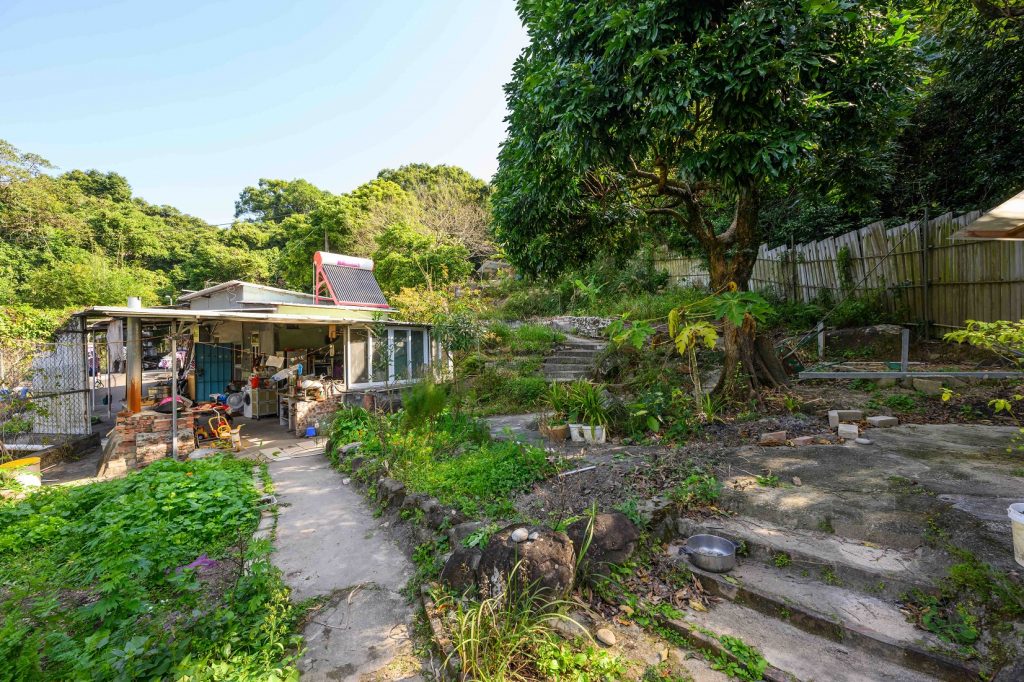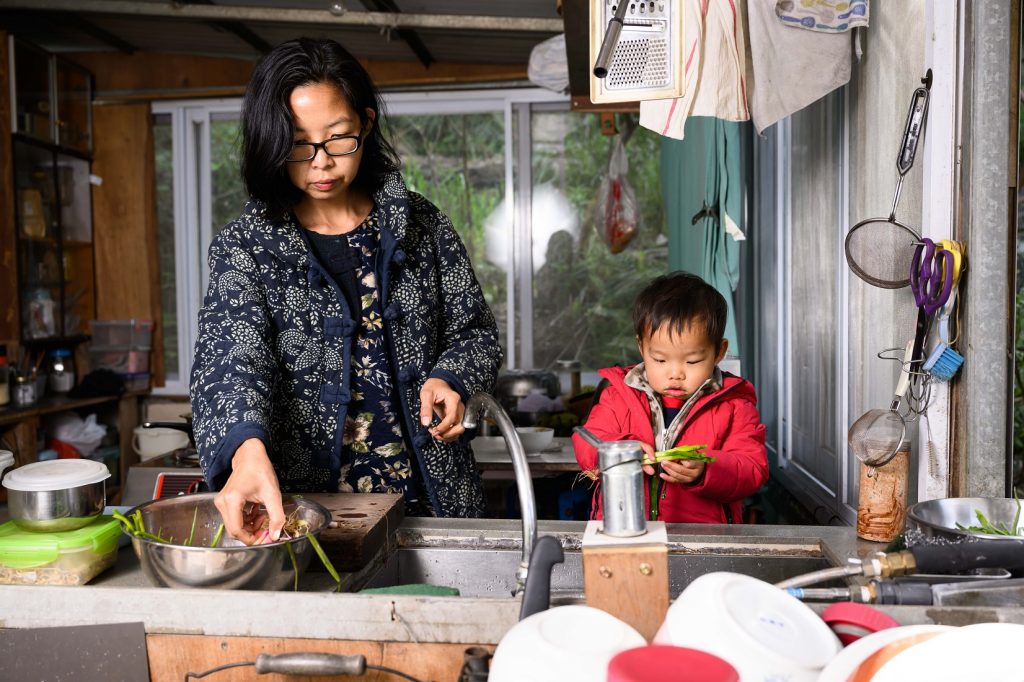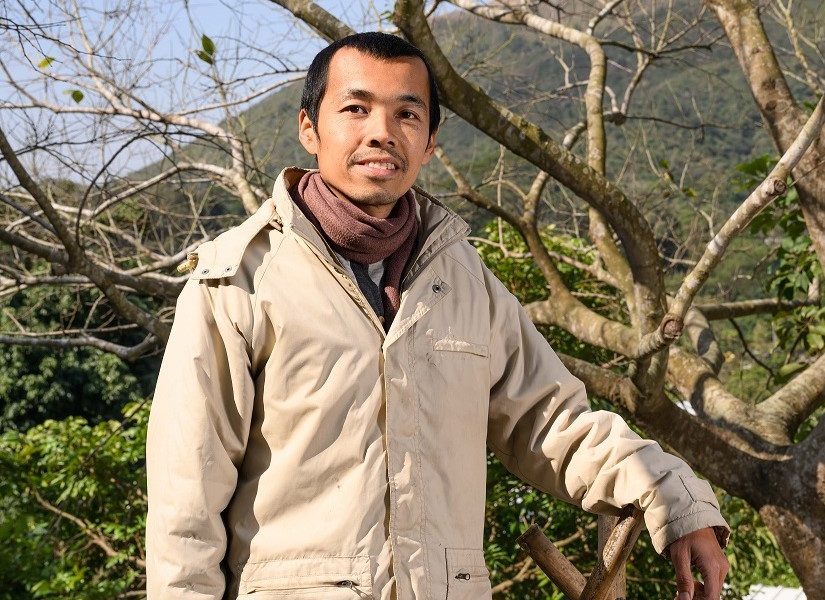Nicknamed Yeah Man (similar to the Cantonese pronunciation of wild man), Mr. Mok Ho Kwong is a dedicated nature conservationist and environmental educator in Hong Kong. After graduating from the University of Hong Kong (HKU) in 2004, he moved to Sheung Shui and founded the nature education organization, Natural Network, in Kai Leng Village. Since then, he has lived a simple and green life. Through the courses provided by Natural Network and his own lifestyle, Yeah Man hopes to inspire families in Hong Kong to shed their misconceptions about nature and embrace the true meaning of a quality, happy life.
A good environment brings happiness
Yeah Man and his family of four live in two stone houses in A Kung-Tin Village in Pat Heung, Kam Tin, which is a 15-minute bus ride from the Kam Sheung Road station. Next to the houses is a vegetable garden with cherry tomatoes, lettuce, herbs and other plants. The family also owns a small tool shed for simple construction and maintenance. Yeah Man cleared a path
from the back of the houses to a nearby hill. With the help of his interns, two flat areas were created on the hill for Yeah Man’s classes. He even made a chair out of bamboo for his enjoyment of the mountain view. Yeah Man’s younger son, who is not of school age yet, wanders around the countryside with his parents every day. Albeit the freezing temperature, he insists on helping his mum wash spring onions. Without air conditioning, the family often plays in the outdoor pool built by Yeah Man in the summer.
Yeah Man has not always been a nature enthusiast. On the contrary, he had been taught by his mother that nature is dirty and dangerous. He recalls, “I rarely visited the countryside when I was a child. Even on our rare family hikes, my mum would forbid me from touching the dirty soil or scary insects so I would not get hurt. How could I appreciate the beauty of nature this way?”
It was not until he grew a little older that he developed an interest in environmental protection – which he deems to be the basis of human survival. He says, “As humans, we need an adequate environment with clean water, air and food to stay healthy. Ironically, the water we drink, the air we breathe and the food we consume are all polluted. At the end of the day, happiness comes from a good environment.” Having studied liberal arts in secondary school, Yeah Man could not major in environmental science at university. After some consideration, he decided to study recreation management at HKU. Meanwhile, he signed up for a couple of eco-tours but had disappointing experiences: “After visiting Chinese white dolphins and learning about ocean conversation, we would be given rice with fish fillets in creamy corn sauce for lunch. This is against the principles of environmental protection.” Later, his professor explained to him that the chemicals in mosquito repellents, sunscreen, insecticides and shampoos are the real sources of pollution, and that he could immerse himself in nature even in this concrete jungle we call Hong Kong. When Yeah Man was a junior, he made up his mind to pursue a career in environmental education.
n 2004, Yeah Man became an entrepreneur shortly after graduating from HKU. Despite his parents’ disapproval, he moved to the countryside and founded Natural Network. He says, “It is not difficult to live in the mountains. Just because we are used to the convenience of living in a city does not make this lifestyle ethical. I felt my previous way of living was wrong. I was prepared to relearn everything and adopt a greener lifestyle.” Fresh out of school, he grasped every opportunity to correct his previous living habits, such as relying on air conditioning, and learnt to live in harmony with nature in order to develop essential life skills before teaching others.
Environmental protection means conserving natural resources
Yeah Man believes that environmental protection should start with conserving natural resources. “Like any other species, humans inevitably consume nature’s resources. However, we should not take more than what we need. As an environmentalist, I try to consume less than what I need. A dining table is an essential piece of furniture in any home: if I purchase mine second-hand, I would be able to conserve more natural resources.” Most of the appliances, furniture and clothes in Yeah Man’s home were bought second-hand. One man’s trash is another man’s treasure: by reusing what others have thrown out, he and his family strive to minimize their impact on the environment.
People online have accused Yeah Man of only using second-hand items because of his low income. He argues, “You do not have to live like a monk to protect the environment. In fact, an eco-friendly lifestyle is a better way of living. Here, I get fresh air, clean water, home-grown vegetables and a quiet neighbourhood, all of which are attributes an urban lifestyle cannot offer. By wearing second-hand clothes that have been washed over and over again, I can minimise my exposure to the chemicals lurking in new clothes. Similarly, pre-owned furniture items contain a smaller amount of formaldehyde. This lifestyle is also less expensive, meaning I get to have more time for myself instead of working day and night. People in Hong Kong never seem to have enough time in a day. Yet, my definition of a quality life is having time dedicated to myself, my family and the activities I enjoy.” On top of working three and a half days per week at Natural Network, Yeah Man is also a part-time lecturer at Hong Kong Community College (HKCC). He makes around HK$10,000 a month whilst enjoying flexible working hours. After paying his HK$6,000 monthly rent, he still has HK$4,000 left for other necessities. “A quality and happy life is not as expensive as you think.”

Money is not the most important thing in raising kids
Yeah Man’s sons are six and two years old respectively, and the elder one is now in primary school. He has no trouble raising two children on HK$4,000 each month as he believes money is not the most important thing in parenthood. “We spend the most on interest classes and toys; some second-hand toys are found in mint condition. Moreover, we make our own toys that cater to our kids’ needs and play patterns to help them learn essential life skills. As for interest classes, my elder son’s swimming classes cost less than HK$100 per lesson. Even without interest classes, children can learn a lot just by spending time with their parents.” Yeah Man points out that it is not uncommon for members of modern families to spend less than enough time with one another, leading to the emergence of “Hong Kong parents” and “Hong Kong children” – terms coined by the media to mock our lack of basic life skills in modern-day society. “Simply by cooking a meal with their parents, children can learn the concepts of weight and volume as well as cooking time, heat levels and portion sizes. We can learn a lot from our daily lives.”
Yeah Man’s elder son has stronger life skills than his peers because they do everything together. When the bicycle was broken, for instance, they learnt how to replace the chain, repair the pedals and pump the tyres. Recently, Yeah Man taught his son how to replace electrical outlets too. He believes that children’s participation relies heavily on their parents’ lifestyle. If a mother does not cook regularly, how can she teach her children? Similarly, if a father knows nothing about repair and maintenance, neither will his children. “The convenience of the urban lifestyle has deprived us of the opportunity to learn essential life skills. Without adequate knowledge of the subject or its potential dangers, most parents would naturally steer their children away from learning about it. This results in discrepancies in our parenting methods.”
Since academic achievement is prioritised over the mastery of essential life skills, children with excellent survival skills may not adapt easily to our local education system. Rather than worrying that his children would struggle to catch up, Yeah Man believes his parenting style and his family’s way of living can make up for the shortcomings of the system. “Despite being an HKU graduate, I felt like a kindergarten student when I moved to the countryside. I asked myself, ‘Why don’t I know how to start a fire to boil some water? Why can’t my classroom knowledge solve any of my struggles?’ Schools do not teach you how to dig a well or install a hose. Our curriculum has failed to prepare our children for life in the real world.”
Do not lose your way in the materialistic world
Yeah Man has been receiving online criticisms about his parenting style – would it undermine his children’s competitiveness, isolate his children from their peers at school and, ultimately, lower their self-esteem? Yeah Man responds calmly, “Comparisons are inevitable but we should not take them too personally. After all, you cannot have everything in life. Even if you have billions of dollars, there will always be someone wealthier than you. The world’s richest list changes every year! As parents, we should teach our children to handle comparison with grace. Rather than satisfying your children’s every material desire, teach them that everyone is unique.”
Since children inevitably develop material desires through comparison among peers, Yeah Man understands that it is paramount for the parents to endure the same value towards life. “If we often talk about moving into a mansion in front of our kids and urge them to make more money, they will naturally dislike living in the countryside. However, if we show them how much we enjoy our lives here, they will love it too. Children are heavily influenced by their parents’ attitude towards life. My wife and I moved here because we believe this environment is best for our kids. As children are prone to lose their way in a materialistic environment, a simpler lifestyle makes parenting easier.”
Allowing children to find their own path
As a nature enthusiast, Yeah Man lets nature take its course when it comes to parenting as well. “Children are born with the instinct to learn. Yet, this instinct is often interrupted by adults especially when they stop their kids from interacting with the environment through movements, touch and asking questions in fear of putting them in danger. The word ‘danger’ has limited many children’s potential. Although allowing kids to find their own path is what is best for them, such a parenting style comes with a lot of hard work. If my son wants to learn how to use the electric screwdriver, for instance, I have to break down one simple action into a few steps for him. First, he must learn to listen to instructions and understand that a tool is not a toy. Then, I would teach him how to use a manual screwdriver first to prepare him for the real thing. Parents must acquire certain life skills before they can educate their children. Most children like to participate; doing what adults can do gives them a sense of accomplishment. When children are given the space to explore their interests, they will grow into curious, courageous and adventurous individuals.”

Yeah Man believes nature education is crucial to children’s growth: “Humans are a part of nature. The knowledge and skills we acquire from nature are most authentic. Many studies have pointed out nature’s role in inspiring children’s innovation. Indeed, we can learn the most direct, authentic and useful knowledge from nature for free. Parents should ditch their stereotypes about nature for their children’s all-round development.” Natural Network, the nature education organisation founded by Yeah Man, hosts a variety of courses regularly to encourage people of all ages to reconnect with nature. Its “Wild Child Course” is offered to families and older children: the former division aims to expose young children to nature whilst teaching parents to let go of the misconception that nature equals danger. Some parents can only picture flash flood or drowning children when they see a river, while others are convinced that teaching their kids how to light a match will result in burns or even a fire. “Through this course, we hope parents will learn to let their children explore on their own. Who knows? Perhaps they will discover their little ones’ hidden talents in the process.”

